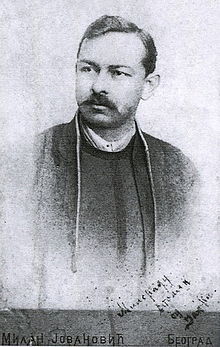Janko Veselinović (writer)
This article includes a list of references, related reading or external links, but its sources remain unclear because it lacks inline citations. (February 2013) |
Janko Veselinović Јанко Веселиновић | |
|---|---|
 | |
| Born | 13 May 1862 Salaš Crnobarski, Principality of Serbia |
| Died | 26 June 1905 (aged 43) Glogovac, Bogatić, Kingdom of Serbia |
| Occupation | Novelist, short story writer, dramatist |
| Literary movement | Literary realism |

Janko "Jan" Veselinović (Serbian Cyrillic: Јанко Веселиновић, pronounced [ˌjâːŋko ʋeseˈlǐːnoʋit͜ɕ], 13 May 1862 – 26 June 1905) was a Serbian writer.
Personal life[]
Janko "Jan" Veselinović was too young to join in the Serbo-Turkish war; but as a teenager in Mačva he saw the fighting, and he inherited a militant Serbian tradition that went back five hundred years, if not more. His father was a parish priest and staff officer in the Serbian army. After graduating from a teacher's college in Belgrade, he returned to the Serbian countryside, in Mačva, west of Belgrade, to teach in different towns and villages (Svilajnac, Glogovac, Šabac and Koceljeva). Living close to his villagers, he began to write stories about their life and soon published his first collection of stories, Slike iz soeskog zivota (Pictures of Village Life, 1866). More were to follow; by the end of his relatively short career he had nonetheless written many stories about the latter half of the 19th century, rural life in Serbia. He moved to Belgrade and attempted to write about life in a city, but with little success. From 1893 he lived in Belgrade, where he was an associate editor of government-owned Srpskih Novina (Serbian News). In 1894, he founded and edited a journal of his own, Zvezda (The Star), but regular issues were published only from 1896 to 1901. At one time he wrote plays for the National Theatre in Belgrade, in collaboration with Serbian stage actor Čiča Ilija Stanojević. He died at Glogovac on 14 June 1905.
According to literary critic Jovan Skerlić and others, Veselinović is best known for his description of the idyllic peasant life in Serbia. Veselinović, even though a realist, idealized his rural folk, adding poetic touches to his descriptions of them. He drew much from the native folklore as well. Even though he depicted the seamy side of rural life, he seemed to lean towards its idyllic aspect, as if trying to arrest the advance of civilization. He also wrote the play Djido.
He was influenced by Milovan Glišić, Milan Đ. Milićević, Đura Jakšić, and Rusyn writer Marija A. Markovič, who went under the assumed name of Marko Vovčuk.
Oeuvre[]
Janko M. Veselinović is in the same class as Svetolik Ranković, who tinged their picaroon romances with the spirit of revolt against established moral and political arrangements. He wrote many novels and stories, which were about patriarchal society of the Serbian big family (zadruga). His stories described the beauty and scenery of his homeland with much skill. The works were written with great attention to numerous ethnographically interesting details of the old Serbian peasant life. His most successful books are: a semi-historical novel entitled Hajduk Stanko (The Rebel Stanko, 1896), which describes with rich color and exciting action, the time of the First Serbian Uprising against the Turks; and Seljanka (A Peasant Woman, 1893), a bleak picture of the life of a peasant woman in rural Serbia in the 19th century.
His works are:
- Pastoral: Stories from Rural Life (Сељанка: приповетке из сеоског живота), novel 1888
- Pictures of Rural Life (Слике из сеоског живота), story, 2 volumes, 1886–88
- Wild Flowers (Пољско цвеце), story, 1890–1891
- Paradise of the Soul (Рајске душе), story, 1893
- Stari poznavitsi (Стари познавици), story, 1891–96
- Hajduk Stanko (Хајдук Станко), novel, 1896
- Fighters (Борци), stories
- Letters from the Village (Писма са села), stories
- Complete works (Целокупна дела) 9 volumes
- The Flute Player, story
- Poteru, play (in collaboration with Čiča Ilija Stanojević), 1895
References[]
| Wikimedia Commons has media related to Janko Veselinović. |
- The factual material for the Wikipedia biography of Janko Veselinović (writer) is adapted from the Serbian of Jovan Skerlić's Istorija Nove Srpske Književnosti / A History of New Serbian Literature (Belgrade 1914, 1921), pages 384–390.
- Also, adapted from Serbian Wikipedia: Јанко Веселиновић
- Gerda Baudisch: The patriarchal village in the narrative work of Janko M. Veselinović (Das patriarchale Dorf im Erzählwerk von Janko M. Veselinović), Munich, 1969
- Serbian novelists
- 1862 births
- 1905 deaths
- Serbian male short story writers
- Serbian short story writers
- 19th-century novelists
- 19th-century short story writers
